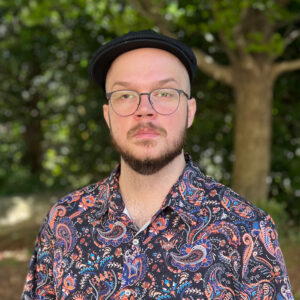Colby
One of the things that a lot of people ask is, “What led you to Skyland Trail?” It’s never as simple as one thing.
It could be trauma from childhood that came into adulthood, substance abuse, or this warped idea of how I needed to be strong. And to be strong I had to take every emotion I felt and push it into a little box and kind of just hope it went away.
But really what led me here was running. Running from myself. Running from my mistakes.
My life had devolved into just distracting myself from… myself. I just didn’t ever want to think about who I was. The thing about distractions—whether their substances, people, or hobbies—you get tolerant of them. It stops working. And that’s how I came here. I had reached sort of a panic. When I realized that this wasn’t going to work anymore. I was at the end of my rope in terms of just treading water.
But fortunately, I was able to come to Skyland Trail’s residential program, in great part due to the help of financial aid.
I can honestly say that I think it saved my life.

Before I get into parts about the program that I really felt helped me, I cannot overstate how much the community here helps people. I can’t speak for everyone, but for many people, just the simple idea of having a place where: people are happy to see you; people are willing to listen; you don’t feel alone; that it’s okay to be sad or upset. That’s life-changing for a lot of us.
We’ve spent a lot of our time alone thinking that we are just broken, and no one else is going to understand. Being able to be in a residential setting with other people is a tremendous help to many of us.
I was part of the dialectical behavior therapy (DBT) program. It focuses a lot on this idea of WISE MIND, which is radically different than anything I ever thought of.
I was a biomedical engineering major. I was always a STEM kid, and so I approached every problem with “how do I quantify it? How do I break it down? What are the variables?” And I can adjust to find a solution. But that doesn’t really work with social anxiety or people or relationships.
I had been stuck in this logical mind for most of my life, and I kept on messing up. I wasn’t able to understand why. A big part of what I learned was that the emotional mind—the other side—was something that I had completely discounted. I hadn’t been paying attention to my emotions whatsoever, I was missing a bunch of variables in this equation I had been trying to fix.
For me, just that idea of approaching the reality of what it means to be a person was helpful. I do feel sad sometimes. I do get mad. I do get jealous or lonely. And being able to not only feel that but express that, was very, very different than how I had been living.
The specific group—and I think many other clients will attest to this—is being with Helen in the art program. It was something that definitely took me by surprise how much it changed me.
I had so many activities and parts of my life that had baggage—the things that I’d spent time with when I was, in my opinion, failing to get by. Whether it was books or games or sports there was always this feeling of, “Oh well I was better before. What have I lost in this thing? I’m not as strong anymore. I’m not whatever.”
My first C in school was in art class, I couldn’t make a shaded sphere! Helen just told me to stop caring so much. Stop fidgeting with perfection. I didn’t have to get it right. Just do it!
She taught me to do these five minutes sketches where we would draw with a pencil. Never erasing. Then after five minutes, we had to stop. I thought, “Well I’m not done. It’s not good! What do you mean!? I can’t work on it more!?”
And Helen said, “No. You’re missing the point. The point is the process. It’s not the result that matters.”
I know it’s cliché, but It’s about the journey, not the destination. That little idea really translated into a lot of aspects of my life. And I really can credit Helen for coming at it from a different angle.
I’ve been through treatment a lot of times. I’ve been through therapy a lot of times. And I had relapsed most of those times. I think a large part of it was because I had this idea of the life I was going back to. That I knew what it was going to be. I was a STEM person, I had always done research.
This time around I realized that maybe that’s not who I am. Maybe that’s who I wanted to be. What I want to be now might not be what I wanted it to be when I was a kid, but it’s still something. And something’s better than nothing.
My plan going forward is to become a Certified Peer Specialist (CPS). I realize that it’s not about some advancement of humanity’s knowledge for me. It’s about connecting with people. That’s what I’ve been missing in my life, real honest connection.
I fundamentally believe that is my fate in life. To share and be there for others, and to be the person I needed when I was struggling.
Included in 2022 Journeys Magazine
